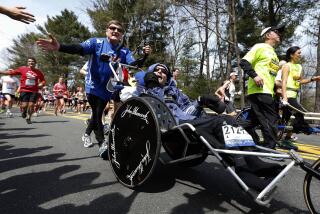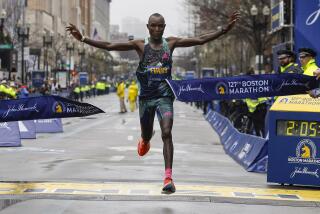Kenyan makes it four at Boston
- Share via
BOSTON -- Every four years, Kenyan marathoners know that ugly internal politics will affect their participation in the Summer Olympics, because their national track federation chooses its Olympic team based on amorphous criteria subject to interpretation and influence peddling.
This Olympic year, Robert Cheruiyot and his compatriots had to deal with internal politics of a different nature. They made “ugly” an inadequate description of the ethnic violence that tore Kenya apart for the month that followed the country’s Dec. 27 presidential elections.
As Cheruiyot prepared to become a four-time champion of the Boston Marathon, winning Monday with a run so impressive it should be enough to convince Kenyan track officials he belongs in Beijing this August, he had to dramatically alter his training plans to steer clear of the horror that has left more than 1,000 people dead and 300,000 homeless.
Breaking Monday’s race open in the 19th mile, Cheruiyot challenged his 2-year-old course record before the absence of competition over the final miles led him to miss it by 32 seconds.
He finished in 2 hours 7 minutes 46 seconds, the sixth-fastest time in the race’s 112 runnings, 1:18 ahead of runner-up Abderrahime Bouramdane of Morocco.
Cheruiyot, 29, who also won in 2003, 2006 and 2007, became the third man with four titles, joining Gerard Cote of Canada and Bill Rodgers. Clarence DeMar won a record seven.
Ethiopia’s Dire Tune won the closest Boston women’s race in history, trading the lead with Russia’s Alevtina Biktimorova three times in the final 800 meters before getting to the line two seconds ahead. Tune’s time was 2:25:25.
If Cheruiyot were picking the 2008 Kenyan Olympic marathon team, it would consist of him and the top two finishers in London, Martin Lel and Samuel Wanjiru.
Of his federation’s plans, Cheruiyot knew only it had promised to pick one runner from Boston. That is why it was so important to him to break 2:08, which became a challenge when he left the pack behind and was running into a head wind of about 5 mph.
“You need company,” he said.
Kenyan men now have won 16 of the last 18 Boston races. Despite the problems in their homeland, they also won the spring’s other two major marathons, London and Rotterdam.
“We are still there,” Cheruiyot said. “As a marathoner, as an athlete, we are trying to do the best we can for our country.”
Kenya dissolved into a month of violence when the incumbent president, a member of the Kikuyu tribe, defeated an opponent backed by the Kalenjin tribe in a disputed election.
“In Kenya the problems were terrible,” said Cheruiyot, a Kalenjin. “Many people in my area were affected.”
Cheruiyot saw the images only from a distance. He was in Brazil when the violence erupted. After returning to Kenya in January, he remained in Nairobi, far from the most dangerous hot spots, until his manager arranged an alternative training site in Namibia.
When relative calm returned to the Eldoret area of western Kenya, he was able to return to train on its mountain and forest trails for three weeks before coming to Boston.
Rita Jeptoo, the 2006 Boston champion who finished third Monday, had remained at her home near Eldoret.
Jeptoo’s concession was to eliminate her early-morning training session for a month because it was not safe to be on dark roads and trails.
“We were afraid a lot,” Jeptoo said.
--
Philip Hersh covers Olympic sports for The Times and Chicago Tribune.
More to Read
Go beyond the scoreboard
Get the latest on L.A.'s teams in the daily Sports Report newsletter.
You may occasionally receive promotional content from the Los Angeles Times.






